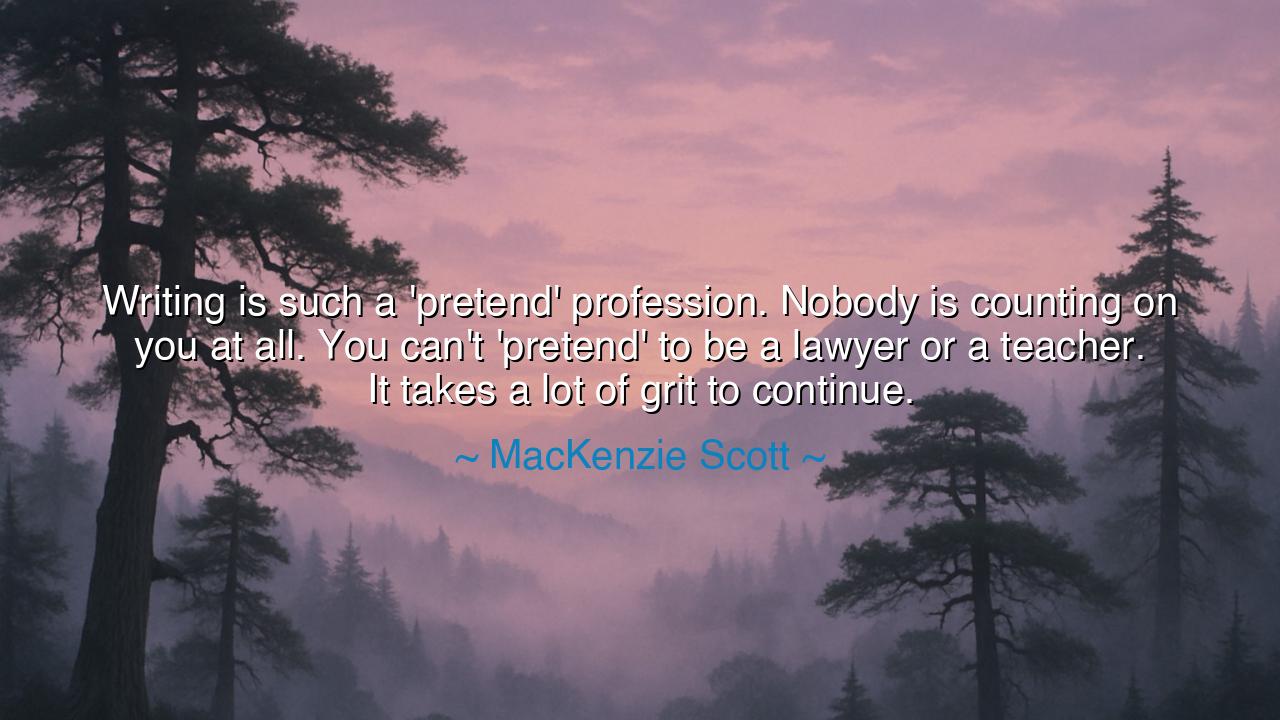
Writing is such a 'pretend' profession. Nobody is counting on
Writing is such a 'pretend' profession. Nobody is counting on you at all. You can't 'pretend' to be a lawyer or a teacher. It takes a lot of grit to continue.






MacKenzie Scott once confessed: “Writing is such a ‘pretend’ profession. Nobody is counting on you at all. You can’t ‘pretend’ to be a lawyer or a teacher. It takes a lot of grit to continue.” In this declaration lies the paradox of the creative life: that it is at once weightless and immense, invisible to the world yet vital to the soul. The writer is not called upon by the courts, nor by the classrooms, nor by the marketplace; no one waits each morning for her pen to move across the page. Yet, though unseen, her labor is as real as stone-cutting, and perhaps harder still, for it demands from her an inner fire to press forward when no voice calls her name.
The origin of this thought is Scott’s own path as both novelist and philanthropist. Before the world knew her for acts of great generosity, she was a woman who struggled in the solitude of the page. She knew the silent, uncertain road of the writer—a road without applause, without deadlines, without a waiting crowd. The lawyer is summoned to court, the teacher is summoned to students, but the writer must summon herself, day after day, with no guarantee that her work will ever be seen. Thus she names it “pretend,” not because it is false, but because it feels like labor without witness.
The ancients, too, wrestled with this mystery. Consider the poets of Greece, wandering and reciting verses, often with no wealth, no patron, no assurance their words would endure. Yet out of their solitary grit came the Iliad and the Odyssey, works that shaped civilizations. When Homer sang, no court was waiting, no contract bound him, yet his unseen toil gave birth to stories that still breathe thousands of years later. What seemed like a “pretend” labor was in truth the forging of immortal fire.
History shows us that countless writers endured this tension. Emily Dickinson, hidden in her quiet room, wrote hundreds of poems that no one around her valued in her lifetime. “Nobody is counting on you,” she might have said, and yet she continued. Her grit, invisible then, became the light of generations. Or think of Franz Kafka, who worked by day as a clerk and wrote by night, convinced his words would vanish. Yet those words, preserved, became pillars of modern thought. The writer’s struggle is always the same: the world does not ask for their work, but the soul demands it.
The meaning of Scott’s words, then, is not despair but courage. She reminds us that to persist in writing, or in any art, requires an inner fortitude that does not depend on applause. The lawyer is upheld by the law, the teacher by the needs of students, but the writer must be upheld by sheer will and devotion. It is the path of those who believe in what cannot yet be seen, who labor for seeds that may not sprout until long after their own passing.
The lesson is clear: if you would walk the road of the writer, or any solitary craft, you must carry within you the fire of grit. Do not expect the world to summon you; summon yourself. Do not wait for permission; begin. Do not measure your worth by applause; measure it by your faithfulness to the work. The labor may feel like “pretend,” but history shows that such unseen toil shapes the destiny of nations and souls.
Practically, let each who longs to write or create set aside time daily, as one would for prayer or training of the body. Honor the work even when unseen. Surround yourself not with voices of doubt, but with reminders of those who endured before you. And most of all, be patient: for though no one may seem to be counting on you today, one day your words may be the very ones that awaken another to hope, courage, or wisdom.
Thus MacKenzie Scott’s words endure as both a warning and a call: “Writing is such a ‘pretend’ profession… It takes a lot of grit to continue.” Let us take them to heart, for though the writer may labor in silence, she keeps alive the flame of imagination, truth, and beauty. And though the world may not count on her day by day, in the end, it is her words that count most of all.






AAdministratorAdministrator
Welcome, honored guests. Please leave a comment, we will respond soon